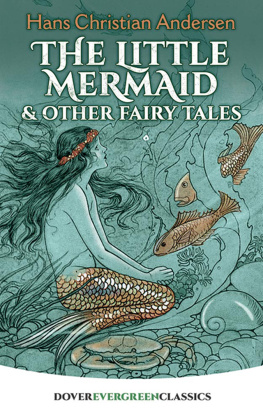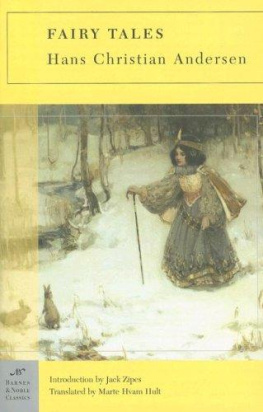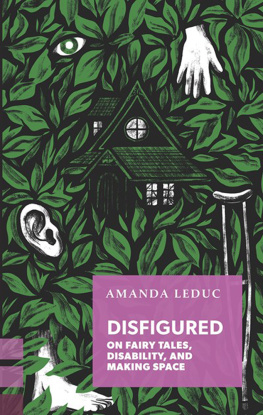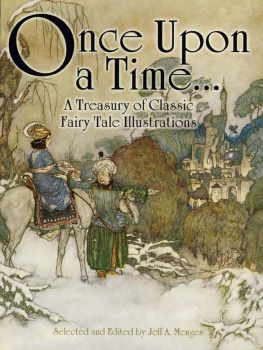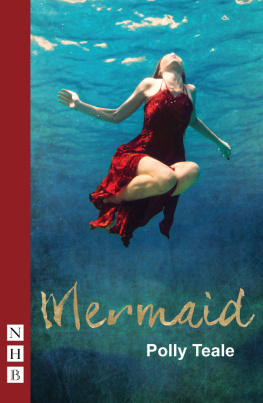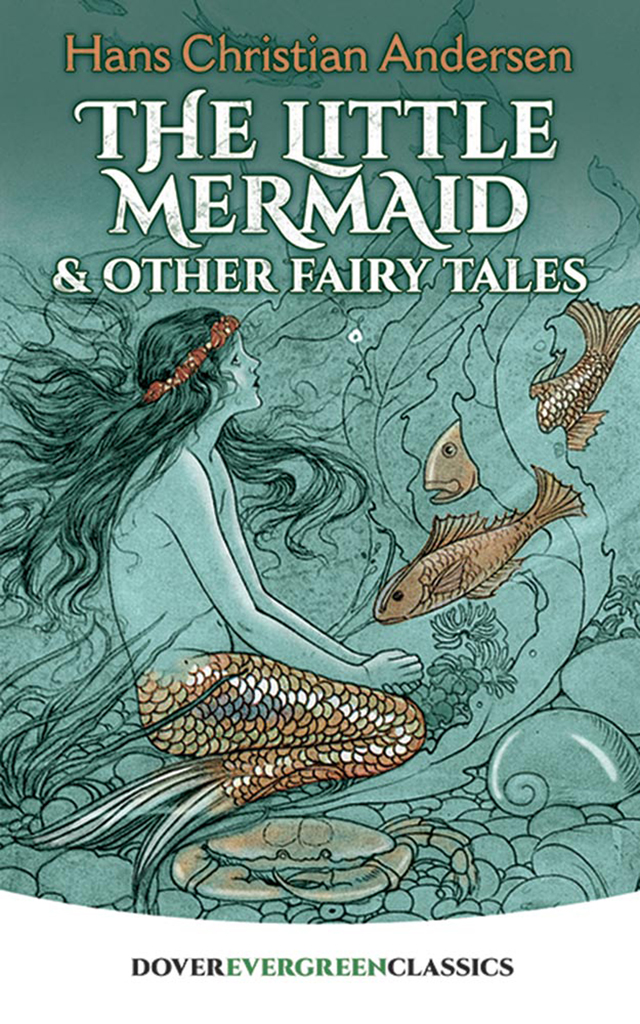The Little Mermaid
F AR out at sea the water is as blue as the bluest cornflower, and as clear as the clearest crystal, but it is very deep, and if many steeples were piled on the top of one another they would not reach from the bed of the sea to the surface of the water. It is down there that the Mermen live.
The most wonderful trees and plants grow there, and such flexible stalks and leaves, that at the slightest motion of the water they move as if they were alive. All the fish, big and little, glide among the branches just as, up here, birds glide through the air. The palace of the Merman King lies in the very deepest part; its walls are of coral and the long pointed windows of clearest amber, but the roof is made of mussel shells which open and shut with the lapping of the water.
The Merman King had been for many years a widower, but his old mother kept house for him; she was a clever woman, but so proud of her noble birth that she wore twelve oysters on her tail, while the other grandees were only allowed six. Otherwise she was worthy of all praise, especially because she was so fond of the little mermaid princesses, her grandchildren. They were six beautiful children, but the youngest was the prettiest of all, her skin was as soft and delicate as a roseleaf, her eyes as blue as the deepest sea, but like all the others she had no feet, and instead of legs she had a fishs tail.
All the livelong day they used to play in the palace in the great halls, where living flowers grew out of the walls. When the great amber windows were thrown open the fish swam in, just as the swallows fly into our rooms when we open the windows, but the fish swam right up to the little princesses, ate out of their hands, and allowed themselves to be patted.
Outside the palace was a large garden, with fiery red and deep blue trees, the fruit of which shone like gold, while the flowers glowed like fire on their ceaselessly waving stalks. The ground was of the finest sand, but it was of a blue phosphorescent tint. There was a wondrous blue light down there; you might suppose yourself high up in the air, with only the sky above and below you. In a dead calm you could just catch a glimpse of the sun like a purple flower with a stream of light radiating from its calyx.
Each little princess had her own little plot of garden, where she could dig and plant whatever she liked. One made her flower-bed in the shape of a whale, another thought it nice to have hers like a little mermaid; but the youngest made hers quite round like the sun, and she would only have flowers of a rosy hue like its beams. She was a curious child, quiet and thoughtful, and while the other sisters decked out their gardens with all kinds of extraordinary objects which they got from wrecks, she would have nothing but the rosy flowers like the sun up above, except a statue of a beautiful boy. It was hewn out of the purest white marble and had gone to the bottom from some wreck.
Nothing gave her greater pleasure than to hear about the world of human beings up above; she made her old grandmother tell her all that she knew about ships and towns, people and animals. But above all it seemed strangely beautiful to her that up on the earth the flowers were scented, and that the woods were green, and that the fish which were to be seen among the branches could sing so loudly and sweetly that it was a delight to listen to them. You see, the grandmother called little birds fish, or the mermaids would not have understood her, as they had never seen a bird.
When you are fifteen, said the grandmother, you will be allowed to rise up from the sea and sit on the rocks in the moonlight, and look at the big ships sailing by, and you will also see woods and towns.
One of the sisters would be fifteen in the following year, but the others,well, they were each one year younger than the other, so that the youngest had five whole years to wait before she would be allowed to come up from the bottom, to see what things were like on earth. But each one promised the others to give a full account of all that she had seen, and found most wonderful on the first day. Their grandmother could never tell them enough, for there were so many things about which they wanted information.
None of them was so full of longings as the youngest, the very one who had the longest time to wait, and who was so quiet and dreamy. Many a night she stood by the open windows and looked up through the dark blue water which the fish were lashing with their tails and fins. She could see the moon and the stars; it is true, their light was pale but they looked much bigger through the water than they do to our eyes. When she saw a dark shadow glide between her and them, she knew that it was either a whale swimming above her, or else a ship laden with human beings. I am certain they never dreamed that a lovely little mermaid was standing down below, stretching up her white hands towards the keel.
The eldest princess had now reached her fifteenth birthday, and was to venture above the water. When she came back she had hundreds of things to tell them, but the most delightful of all, she said, was to lie in the moonlight on a sandbank in a calm sea, and to gaze at the large town close to the shore, where the lights twinkled like hundreds of stars; to listen to music and the noise and bustle of carriages and people, to see the many church towers and spires, and to hear the bells ringing; and just because she could not go on shore she longed for that most of all.
Oh! how eagerly the youngest sister listened, and when later in the evening she stood at the open window and looked up through the dark blue water, she thought of the big town with all its noise and bustle, and fancied that she could even hear the church bells ringing.
The year after, the second sister was allowed to mount up through the water and swim about wherever she liked. The sun was just going down when she reached the surface, the most beautiful sight, she thought, that she had ever seen. The whole sky had looked like gold, she said, and as for the clouds! well, their beauty was beyond description, they floated in red and violet splendor over her head, and, far faster than they went, a flock of wild swans flew like a long white veil over the water towards the setting sun; she swam towards it, but it sank and all the rosy light on the clouds and water faded away.
The year after that the third sister went up, and being much the most venturesome of them all, swam up a broad river which ran into the sea. She saw beautiful green, vineclad hills; palaces and country seats peeping through splendid woods. She heard the birds singing, and the sun was so hot that she was often obliged to dive to cool her burning face. In a tiny bay she found a troop of little children running about naked and paddling in the water; she wanted to play with them, but they were frightened and ran away. Then a little black animal came up, it was a dog, but she had never seen one before; it barked so furiously at her that she was frightened and made for the open sea. She could never forget the beautiful woods, the green hills and the lovely children who could swim in the water although they had no fishes tails.
The fourth sister was not so brave, she stayed in the remotest part of the ocean, and, according to her account, that was the most beautiful spot. You could see for miles and miles around you, and the sky above was like a great glass dome. She had seen ships, but only far away, so that they looked like seagulls. There were grotesque dolphins turning somersaults, and gigantic whales squirting water through their nostrils like hundreds of fountains on every side.

